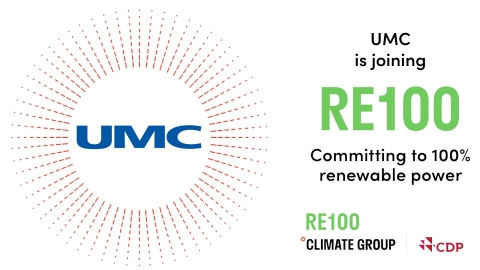UMC Pledges Net Zero Emissions by 2050
United Microelectronics Corporation (NYSE: UMC) has pledged to achieve net zero carbon emissions by 2050, becoming the first semiconductor foundry to do so. This commitment aligns with the Paris Climate Agreement, aiming to limit global warming to 1.5°C. UMC also joined RE100, vowing to utilize 100% renewable energy by 2050, targeting 15% by 2025 and 30% by 2030. Collaborating with over 500 suppliers, UMC aims for a 20% reduction in carbon emissions and increasing renewable energy usage to 20% in its supply chain by 2030.
- UMC is the first semiconductor foundry to pledge net zero carbon emissions by 2050.
- Joined RE100, committing to 100% renewable energy by 2050.
- Aims for a 20% reduction in carbon emissions across its supply chain by 2030.
- None.
Insights
Analyzing...
United Microelectronics Corporation (NYSE: UMC; TWSE: 2303) (“UMC”) today announced its pledge to reach net zero carbon emissions by 2050 and to take concrete steps to Net Zero Action as the first semiconductor foundry globally. UMC is ardently responding to the Paris Climate Agreement goal and pursuing efforts to limit the global warming not exceeding 1.5°C. In the meantime, UMC has obtained admission into RE100, becoming the second semiconductor wafer foundry in this initiative, and committed to use

UMC is joining RE100 (Graphic: Business Wire)
To reach net zero carbon emissions by 2050, UMC has three resolutions to cover direct emissions from fab operations (Scope 1), indirect emissions from energy consumption (Scope 2), and indirect emissions from value chain (Scope 3). The three resolutions are:
- Persistent and proactive carbon emission reduction: Through continually developing advanced foundry process technologies, enhancing productivity and improving energy efficiency, UMC is able to minimize carbon emissions in both manufacturing stage of wafers and using stage of IC end products.
-
100% renewable energy: A 3-stage objective of15% by 2025,30% by 2030, and100% by 2050 is set to substantially increase the proportion of consuming renewable energy, UMC will also invite its value chain to support the low-carbon energy transition. - Investment in net-zero technologies: UMC commits to invest in net zero emissions technologies and participate in Carbon Offset Projects to remove and offset carbon emissions that are inevitable or still subject to technical restrictions.
Sam Kimmins, Head of RE100, The Climate Group said: “I am delighted to welcome UMC to RE100. By committing to
SC Chien, UMC co-president and Chief Sustainability Officer (CSO), stated: “Climate change is the single biggest threat to our planet’s sustainability. Despite the COVID-19 pandemic, we still make efforts to fight climate change, which is why we are able to unveil our pledge to achieve net-zero emissions by 2050 just ahead of World Environment Day on June 5. As a global citizen, we are doing our part to build sustainable living for mankind.”
UMC established the Corporate Sustainability Committee in 2008, leading the industry to systematically promote corporate governance, environmental protection and social participation. And since then, UMC has been listed as a global index component of the Dow Jones Sustainability Index (DJSI) for 13 consecutive years. In response to greater level of concerns about ESG governance, UMC established the ESG Steering Committee in 2020 Q4 to strengthen ESG governance within existing corporate structure. Two co-presidents are heading the committee as chairs and all management team members are involved in. A CSO, Chief Sustainability Officer, is also appointed. Furthermore, UMC has issued green bonds for the first time in early April 2021 to promote ESG. The funds raised are mainly used for projects such as the construction of renewable energy systems, the improvement of equipment energy efficiency, and the prevention and control of manufacturing process pollutions. UMC’s practices on climate change governance are also in line with the international TCFD (Task Force on Climate-related Financial Disclosures) initiative. In May 2021, UMC led its global wafer foundry peers to pass the “TCFD Third-Party performance assessment,” and was rated as the highest “pioneer level” by the inspection agency SGS Taiwan Ltd., endorsing that the climate change risk assessment system promoted by UMC and associated financial disclosure data are highly credible and transparent, which are fully in compliance with stakeholders' expectations.
UMC has consistently upheld the concept of “Green Production,” and has implemented energy and resource reduction plans since 2010, including “Project 333” (from 2010 to 2012),” Project 369+” (2013–2020) and “Green 2020” (2016–2020). As of 2020, total carbon reductions reached 12.26 megatons of carbon dioxide equivalent (CO2e), equal to 8.17 million hectares of forest annual carbon absorption. On the other hand, UMC is also working vigorously with its suppliers to make sustainability a reality. In 2017, UMC introduced the “Triple-R League” to promote Reducing, Reusing and Recycling with supply chain partners. Over the past three years, 39 suppliers have joined the initiative and together they made remarkable achievements - the carbon reductions efforts made by this project were about 4.09 million tons, equal to 27,000 hectares of forest annual carbon absorption.
Note: the factor of yearly forest carbon absorption is reference to Taiwan EPA, which is 15 tonnes per hectare.
About RE100
RE100 is a global initiative bringing together the world’s most influential businesses committed to
About UMC
UMC (NYSE: UMC, TWSE: 2303) is a leading global semiconductor foundry. The company provides high quality IC production with a focus on both logic and specialty technologies to serve every major sector of the electronics industry. UMC’s comprehensive technology and manufacturing solutions include logic/RF, embedded high voltage, embedded flash, RFSOI/BCD and IATF-16949 automotive manufacturing certification for all its manufacturing facilities. UMC operates 12 fabs that are strategically located throughout Asia with a maximum capacity of more than 750,000 8-inch equivalent wafers per month. The company employs approximately 19,500 people worldwide, with offices in Taiwan, China, United States, Europe, Japan, Korea and Singapore. For more information, please visit: https://www.umc.com.
Note from UMC Concerning Forward-Looking Statements
Some of the statements in the foregoing announcement are forward-looking within the meaning of the U.S. Federal Securities laws, including statements about introduction of new services and technologies, future outsourcing, competition, wafer capacity, business relationships and market conditions. Investors are cautioned that actual events and results could differ materially from these statements as a result of a variety of factors, including conditions in the overall semiconductor market and economy; acceptance and demand for products from UMC; and technological and development risks. Further information regarding these and other risks is included in UMC’s filings with the U.S. Securities and Exchange Commission. UMC does not undertake any obligation to update any forward-looking statement as a result of new information, future events or otherwise, except as required under applicable law.
View source version on businesswire.com: https://www.businesswire.com/news/home/20210531005337/en/







